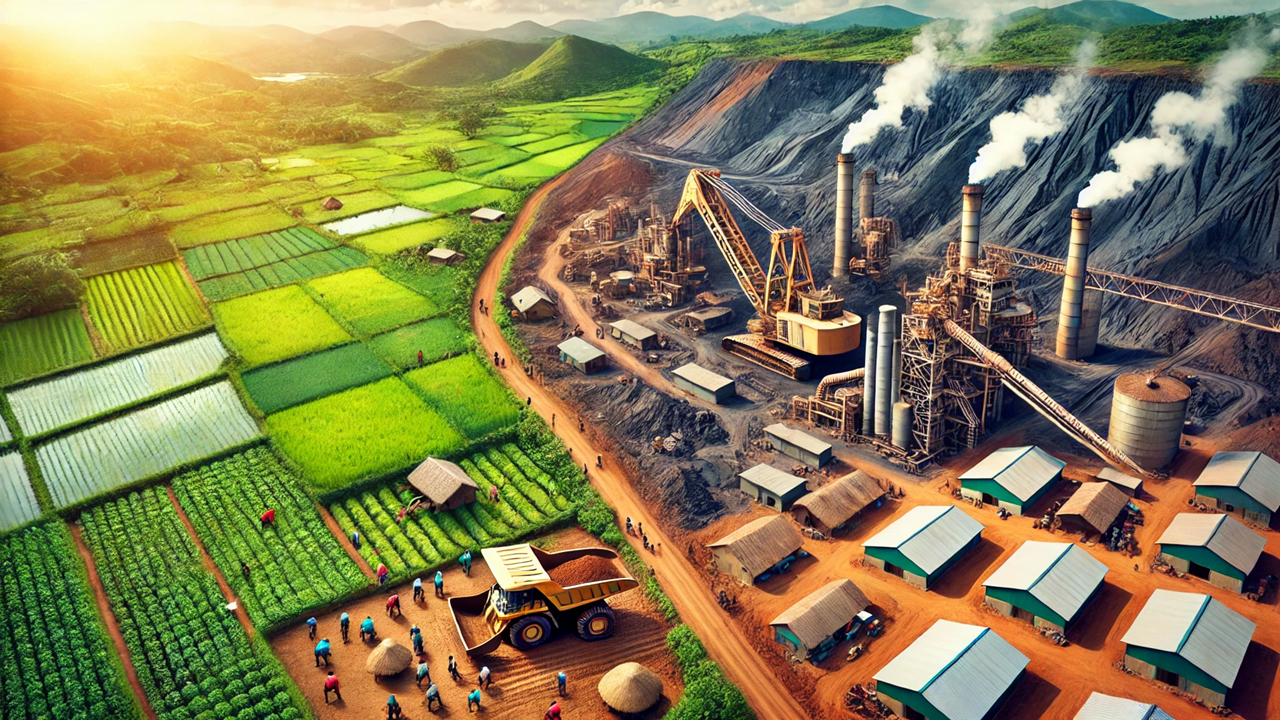Guinea’s Growth: Turning Natural Resources into Sustainable Development
Guinea’s economy is growing rapidly, but translating this growth into sustainable development is a challenge. The Guinea Economic Update: Natural Resource Management for Development report by the World Bank highlights the importance of better management of mining revenues, climate-proofing agriculture, and investing in infrastructure to ensure inclusive growth. With climate change posing serious risks, Guinea must align its development strategy with environmental goals to secure a resilient future.

Guinea, a country rich in natural resources, has seen its economy grow steadily in recent years, largely driven by the mining sector. However, the nation faces a pressing challenge: how to translate this wealth into inclusive development that benefits its citizens and builds resilience against climate risks. The Guinea Economic Update: Natural Resource Management for Development report, published by the World Bank in September 2024, highlights the complexities of managing economic growth, addressing poverty, and sustaining development amid environmental and governance challenges.
Mining Sector: A Booming Economy with Limited Local Benefits
In 2023, Guinea's GDP growth surged to 7.1 percent, bolstered by a mining boom, with bauxite production up by 22 percent and gold by 10 percent. The sector's expansion, however, has not translated into widespread economic benefits for the broader population. A key issue lies in the weak linkages between the mining sector and the rest of the domestic economy. Mining activities, while contributing significantly to GDP, have minimal impact on job creation and poverty reduction due to the sector's capital-intensive nature and low employment capacity.
Furthermore, Guinea’s economic growth faces the risk of Dutch disease, a situation where an over-reliance on resource exports causes the local currency to appreciate, making other exports less competitive and stifling diversification. This phenomenon poses a significant challenge to sectors like agriculture and manufacturing, hindering their potential to contribute to sustainable and inclusive development.
Agriculture: The Backbone of Climate-Resilient Growth
Agriculture plays a crucial role in Guinea’s economy, contributing nearly 28 percent to the country’s GDP and employing over half the population. However, the sector is highly vulnerable to climate change, with rising temperatures, erratic rainfall, and increased risk of flooding threatening productivity. The report emphasizes that without appropriate measures, Guinea’s agricultural output could decline by as much as 25 percent in the coming decades, jeopardizing food security and livelihoods.
The government has outlined strategies for climate-proofing agriculture, including enhancing water management, adopting sustainable agricultural practices, and investing in reforestation and agroforestry. Transitioning from subsistence farming to a market-oriented approach is essential for boosting productivity, reducing poverty, and ensuring food security. Yet, this transformation is complex and requires significant investment in infrastructure, such as roads and irrigation systems, as well as in human capital.
Fiscal and Policy Reforms: Building a Path to Sustainable Development
Guinea’s fiscal management has been relatively stable, but the mining sector’s contribution to public revenue remains underwhelming due to tax exemptions and challenges in monitoring company operations. Despite this, the country has maintained a low fiscal deficit, averaging just 1.4 percent of GDP from 2016 to 2023. The World Bank’s report calls for improved domestic revenue mobilization, particularly from the mining sector, to support broader economic development.
The government is urged to fully implement the bauxite reference price regulation and strengthen its ability to collect revenues from the mining industry. In addition, the report recommends enhancing public investment management and ensuring that infrastructure projects, such as roads, energy, and telecommunications, are designed to withstand climate change impacts.
To ensure sustainable development, Guinea must also expand access to education, health, and social services, creating a more resilient and diversified economy. The report suggests using savings from reduced energy subsidies to invest in human capital, which is crucial for breaking the cycle of poverty and enabling long-term growth.
Navigating a Path Forward: Challenges and Opportunities
While Guinea’s economy is projected to continue growing, achieving truly inclusive and sustainable development will require more than just robust GDP figures. Addressing the weaknesses in natural resource governance and tackling the threats posed by climate change are essential steps.
The country’s recently updated Nationally Determined Contribution (NDC) framework aims to achieve net-zero emissions by 2050. Yet, the estimated cost of $13.8 billion to reach these targets is daunting, and with a funding gap of $11.6 billion, securing international partnerships and private sector investments will be vital. The report stresses that linking Guinea’s development strategy to climate action is not just an environmental necessity but a foundation for economic resilience.
Investments in sustainable forestry, water management, and climate-resilient infrastructure will be crucial for mitigating climate risks and preserving natural capital. Moreover, aligning fiscal and governance reforms with environmental priorities can help transform Guinea’s abundant natural resources into engines of inclusive growth.
The Guinea Economic Update: Natural Resource Management for Development underscores that while the country’s natural wealth offers substantial growth potential, effective management of these resources is imperative for creating an economy that benefits all Guineans. By addressing fiscal inefficiencies, investing in sustainable agriculture and infrastructure, and aligning development goals with climate resilience, Guinea can pave the way for a more inclusive and prosperous future.
- FIRST PUBLISHED IN:
- Devdiscourse
ALSO READ
India's Job Crisis Amid 7% Economic Growth: Raghuram Rajan's Insights
PM Modi Dedicates Bidkin Industrial Area: A Catalyst for Marathwada's Economic Growth
ADB Approves $30M Package for Climate Resilience and Livelihood Development in Nepal
UK Economic Growth Slows to 0.5% in Q2
Mashatile Affirms SA’s Commitment to Inclusive Economic Growth During UK Visit










